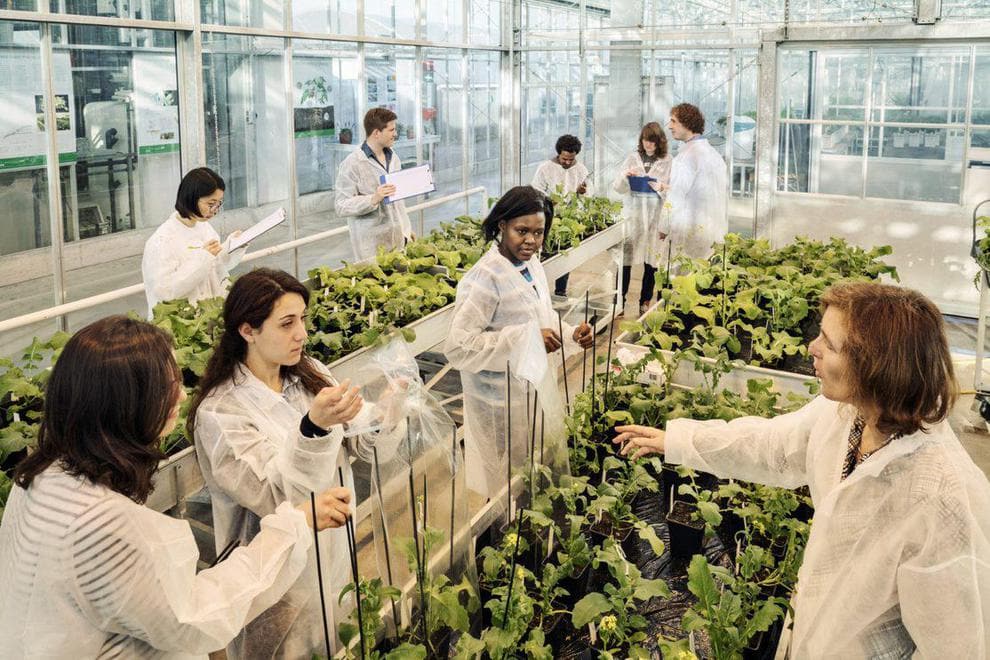
NLWorks supports a private-public partnership that aims to establish a controlled environment ag-tech ecosystem in Kentucky (US) using Dutch knowledge, products and services. The program will provide substantial job growth in this sector in both countries and provide Dutch solutions to local and global challenges on food insecurity.
Visit the website of Let’s Grow Together
The need for action
Feeding the world is increasingly challenging. By 2050, the global population is expected to exceed 10 billion people, and a changing climate, inconsistent rainfall patterns, and unpredictable growing seasons are already affecting crop yields worldwide. At the same time, arable cropland is developed, as the trend towards urbanization increases. The next generation will face the challenge of growing healthier food for more people while using less land in an unpredictable climate environment. A challenge that Dutch companies and knowledge institutes have taken up quite successfully.
As Americans burn less and less coal every year, coal production is dwindling in Kentucky, leaving many former mine workers out of work. Simultaneously, the local tobacco industry has suffered a similar fate, leaving tobacco workers in hardship. The US-Dutch partnership ‘Let’s Grow Together’ seeks to reverse this trend.
Collectively Dutch and US-based companies, knowledge institutes, and governmental institutions are working as partners on creating large-scale, controlled-environment ag-tech solutions in the US. Our mission is to establish a sustainable and healthy local food production system in Kentucky. This initiative offers year-round employment opportunities for Kentucky’s workforce, ensuring affordable and nutritious food for millions of Americans, whilst increasing economic growth.
Social and economic impact
Kentucky’s location relative to consumer conglomerations is favorable: within an 800-km radius (day trip for a truck) two-thirds of the US population in an area between the Gulf of Mexico, the Great Lakes, and the East Coast can be reached. This means tomatoes can be in stores in New York, Chicago, Washington DC, and Atlanta within 36 hours of harvesting. Kentucky also has a large underutilized, skilled and hardworking labor force, a business-friendly climate, and plentiful and relatively cheap natural and energy resources. This makes Kentucky the ideal place to locate a greenhouse cluster and a complete ag-tech ecosystem. But for a sustainable and scalable growth of the ag-tech businesses, providing techniques and hardware is not enough; an entire ecosystem needs to be created to make this transition a sustainable one.
For individual companies, a project of such scale and magnitude goes beyond their scope of business and capacity. It requires a multi-year private-public effort based on a solid business case and growth model to push such an initiative to the next phase and level.
The AgTech Ecosystem Kentucky: Inception study by Wageningen University, commissioned by the Dutch Enterprise Agency (RVO), Dutch Embassy Washington DC, and NLWorks, showed that the commercial opportunity for Dutch companies in this development is also compelling. The Dutch ag-tech sector can be an important ally in solving these challenges.
The role of NLWorks and the Netherlands
Thanks to guidance from the Dutch embassy network in the US and with the help of local government, industry, and knowledge institutes, there is an active search for an alliance with Dutch partners willing to provide agricultural knowledge, technology, and services for the build-up of a new ecosystem. From the Dutch side, this initiative has received support from the Dutch government, with public and private support for this initiative also growing rapidly.
In June 2020, with the support of NLWorks, a collaboration agreement was signed by 17 Dutch and US businesses, knowledge institutes, and government organizations. The objective was to initiate the development of a local AgTech ecosystem modeled after the Dutch ecosystem and the triple helix cluster approach*.
In this collaboration, NLWorks acts as the primary driving force in the Netherlands, facilitating the transition, liaising with Dutch public entities, knowledge institutions, and private companies.
About the collaboration
This collaboration is indispensable in developing knowledge and stimulating innovation. Access to funding provided the necessary resources, allowing the consortium to create a company with impact. Together, these elements form a robust framework that brings together expertise, investment, and dedication. Shaping not only the program but also a transformative force in the marketplace.
Since the start of this program, there have been four controlled-environment facilities built in the Appalachian region. Namely:
- a 60-acre flagship farm in Morehead, Ky., producing tomatoes;
- a 15-acre indoor farm for salad greens in Berea, Ky.;
- a 30-acre farm for strawberries and cucumbers in Somerset, Ky.;
- and a 60-acre farm in Richmond, Ky., for tomatoes.
The two largest greenhouses have yielded successful results. Richmond’s cutting-edge 60-acre indoor farm is already reaping the rewards of its inaugural growing season, yielding Campari and Maranice ‘Tomatoes on the Vine’ for shipment. Meanwhile, Morehead’s flagship 60-acre farm has outperformed expectations, launching its third harvesting season ahead of schedule. The facility in Morehead specializes in beefsteak tomatoes, tomatoes on the vine, and snacking tomatoes.
The feasibility study of a Controlled Environment Agriculture (CEA) Ecosystem in Kentucky listed 10 recommendations for the development of an AgTech ecosystem. These recommendations included a clear pathway for open field and mid-tech high tunnel growers to grow towards high-tech CEA production and the development of relevant educational programs. As part of this effort, Dutch and U.S. partners have jointly developed a tailored technical approach to provide SME farmers with a proposition that, when complete, can be used to create market movement through rapid technology advancement at the SME, medium – and high – tech levels driven by what specified Dutch businesses can offer to spur relevant, implementable, and cost-effective technology adoption.
In addition, the knowledge partners are working to further enhance the collaboration(s) and possibilities for student-lecture exchanges, internships, student projects between educational institutions and closing the gap with industry in Kentucky.
Actively supported by state government, the program continuously serves to create a sustainable and healthy food production that can help reduce poverty, provide sustainable jobs and create a healthy diet for many of Kentucky’s inhabitants.
As of October 2023, 29 partners are dedicated in making this program a success. Also, 1,000 jobs** have been created in CEA since the inception of the partnership.
* The Triple Helix model is a framework for university-industry-government collaboration. It is an approach to economic development that emphasizes the interaction and collaboration between three main actors: universities (knowledge), industries (businesses), and government (policymakers). The idea behind this model is to foster innovation, economic development, and competitiveness by encouraging these three sectors to work together in a coordinated manner.
**AppHarvest Looks to Reorganize with Bankruptcy Filing – Smiley Pete Publishing
Learn more:
- Visit the Let’s Grow Together website for more information about the program



Partnership developer


Sustainable development goals (SDGs)





